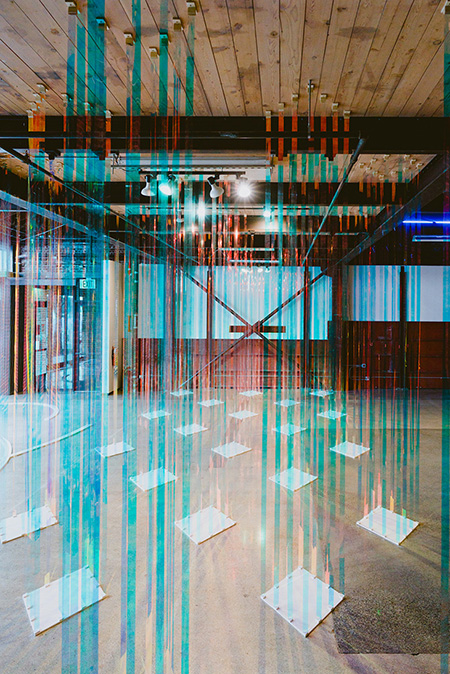
Continuing through April 1, 2023
Seattle-based Henry Jackson-Spieker is still early in his career, but he has already produced several highly visible public installations. His current gallery exhibition, “Interstitial Volume” comprises three distinct installations (all under the single title) that make a strong and distinctive first impression while referencing (without rehashing) notable works of the Light and Space Movement. Above all, Jackson-Spieker is clearly serious about fabrication in all the media he employs. He’s also very clever in his choice of media, and his how incorporation of each into truly site-specific works.
MadArt Studio is located in South Lake Union, Seattle, the main stomping grounds of Amazon, Google, and a slew of other tech and pharma companies. Their programs are designed to beam new works directly into the eyeballs of passersby in this upscale but otherwise art-starved part of town. Its street-facing wall of windows makes the space a fishbowl, allowing us to peer in during the installation process and at the completed work over the course of an exhibition’s run.
However, Jackson-Spieker’s installations are not particularly visible from the street. They are just visible enough to tantalize with their meshes of strings and shimmering plastic film. They beckon you to get in among them, and if you are walking down Westlake Avenue I recommend that you take the bait.
“Interstitial Volume” is described as an immersive installation. It’s immersive to the extent that one can physically occupy the space that it creates, but one is not really transported by it. That goes even for the frontmost installation, which forms an almost invisible shell of black cotton string, held taut between symmetrical curved armatures on the ground and exposed beams above. It’s an able retread of the string installation genre that seemed to proliferate a decade ago, but it isn’t the star of the show.
That would be the central installation, occupying the volume between the floor and ceiling in the middle of the studio, beneath the mezzanine. As I mentioned above, Jackson-Spieker’s work recalls structures from the Light and Space movement, but I haven’t seen this effect before: Dozens of identical diamond-shaped boards on the ground each forming a base for a dozen strips of dichroic mylar tape. The effect up close is quite pretty, and becomes a dramatic, spectral wall when you step further back and see it all through the sunlight. I couldn’t help but think of the best of Peter Erskine’s rainbow works, while individually each board and its strips suggested a deconstruction of Robert Irwin’s prismatic columns.
That goes as well for the third installation of “Interstitial Volume,” which is not visible until you make your way to the back of the main room and look up toward the skylights. There you see a pair of visually ambiguous light sculptures using scrims, neon lights, and other devices.
From this description you might think the work achieves something similar to a James Turrell skylight. But in fact, the effects here are much more obscure and dim. A better visual comparison might be Larry Bell’s Vapor Paintings, with their vague elliptical forms, but with real luminosity and depth that you simply can’t capture with a camera.
A lot of recent art of this genre feels ready made for selfies and social media spectacles. Jackson-Spieker’s works eschew that tendency. Their very construction is too diffuse to read well in a reproduction, and while that doesn’t do the work any favors online, it makes the surprise of seeing these works in person well worth passing through those glass doors.
